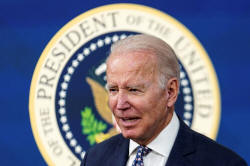U.S. marshals other nations, challenges OPEC+ with release of oil
reserves
 Send a link to a friend
Send a link to a friend
 [November 24, 2021] By
Timothy Gardner [November 24, 2021] By
Timothy Gardner
WASHINGTON (Reuters) -The administration of
U.S. President Joe Biden announced on Tuesday it will release millions
of barrels of oil from strategic reserves in coordination with China,
India, South Korea, Japan and Britain, to try to cool prices after OPEC+
producers repeatedly ignored calls for more crude.
Biden, facing low approval ratings and accelerating inflation ahead of
next year's congressional elections, has grown frustrated at repeatedly
asking the Organization of the Petroleum Exporting Countries and its
allies, known as OPEC+, to pump more oil without any response.
"I told you before that we're going to take action on these problems.
That's exactly what we're doing," Biden said in remarks broadcast from
the White House.
"It will take time, but before long you should see the price of gas drop
where you fill up your tank, and in the longer-term we will reduce our
reliance on oil as we shift to clean energy," he said.
Crude oil prices recently touched seven-year highs, and consumers are
feeling the pain. Retail gasoline prices are up more than 60% in the
last year, the fastest rate of increase since 2000, largely because
people have returned to the roads as pandemic-induced restrictions have
eased.
Under the plan, the United States will release 50 million barrels, the
equivalent of about two and a half days of U.S. demand. India,
meanwhile, said it would release 5 million barrels, while Britain said
it would allow the voluntary release of 1.5 million barrels of oil from
privately held reserves.

Japan will release "a few hundred thousand kilolitres" of oil from its
national reserve, but the timing of the sale has not been decided,
industry minister Koichi Hagiuda told reporters on Wednesday.
Earlier the Nikkei newspaper reported that Japan will release about 4.2
million barrels of oil (666,666 kilolitres) or about 1 or 2 days' worth
of its demand. A Japanese refining source said it has already bought oil
for processing in February 2022.
Seoul has said it would decide after discussions with the United States
and other allies, but did not provide any details.
China, the world's largest crude importer, remains non-committal, though
it has taken steps this year to cool price rises of other commodities in
its domestic market. Beijing will release crude oil from its reserves
according to its needs, a foreign ministry spokesman said on Wednesday.
"As a result, the Biden administration will have to turn to China again.
This is a direction that benefits everyone, but China clearly has the
upper hand," the state-backed Global Times said in an editorial.
Brent crude rose for a second day on Wednesday to $82.70 a barrel by
0908 GMT, after falling more than 10% for several days on concerns of
more supplies from SPR releases. Goldman Sachs said the volume announced
was "a drop in the ocean". [O/R][nL1N2SF013]
It was the first time that the United States had coordinated such a move
with some of the world's largest Asian oil consumers, officials said.
OPEC+, which includes Saudi Arabia and other U.S. allies in the Gulf, as
well as Russia, has rebuffed requests so far to pump more. It meets
again on Dec. 2 to discuss policy but has so far shown no indication it
will change tack.

[to top of second column] |

U.S. President Joe Biden announces the nomination of Federal Reserve
Chair Jerome Powell for a second four-year term, and Federal Reserve
board member Lael Brainard to serve as vice chair, in the Eisenhower
Executive Office Building’s South Court Auditorium at the White
House in Washington, U.S., November 22, 2021. REUTERS/Kevin Lamarque/File
Photo

The group has been struggling to meet existing targets
https://www.reuters.com/markets/
europe/us-wants-more-oil-opec-cant-turn-tap-much-harder-2021-11-23 under its
agreement to gradually increase production by 400,000 barrels per day (bpd) each
month - a pace Washington sees as too slow - and it remains worried that a
resurgence of coronavirus cases could again drive down demand.
Recent high oil prices have been caused by a sharp rebound in global demand,
which cratered early in the pandemic in 2021, and analysts have said that
releasing reserves may not be enough to curb further rises.
"It's not large enough to bring down prices in a meaningful way and may even
backfire if it prompts OPEC+ to slow the pace at which it is raising output,"
said Caroline Bain, chief commodities economist at Capital Economics Ltd.
The administration has also pointed to a notable gap between the price of
unfinished gasoline futures and the retail cost of gasoline, which has widened
to about $1.14 a gallon from roughly 78 cents in mid-October. The White House
urged the Federal Trade Commission to investigate the issue last week.
Biden's political opponents have seized on the announcement to criticize his
administration's efforts to decarbonize the U.S. economy and discourage new
fossil fuel development on federal lands.
"Tapping the Strategic Petroleum Reserve will not fix the problem," said Senator
John Barrasso, the ranking Republican on the Senate energy committee.
The release from the U.S. Strategic Petroleum Reserve would be a combination of
a loan and a sale to companies, U.S. officials said. The 32 million-barrel loan
will take place over the next several months, while the administration would
accelerate a sale of 18 million barrels already approved by Congress to raise
funds for the budget.
An OPEC+ source said releasing reserves would complicate its calculations, as it
monitors markets on a monthly basis. However, they and several analysts said the
release was not as big as the headline figure suggested. They said Britain and
India were releasing modest amounts and the United States had already announced
some releases, and so the additional quantity was less than expected.
The United States historically has worked on coordinated stocks releases with
the Paris-based International Energy Agency (IEA), a bloc of 30 industrialised
energy consuming nations.

Japan and South Korea are IEA members. China and India are only associate
members.
(Reporting by Timothy Gardner in WashingtonAdditional reporting by Sonali Paul
in Melbourne, Ghaida Ghantous in Dubai, Ahmad Ghaddar in London, OPEC team,
Jarrett Renshaw in Philadelphia, Alexandra Alper and Jeff Mason in Washington,
Jessica Resnick-Ault in New York, Aaron Sheldrick in Tokyo, Yew Lun Tian in
Beijing and Florence Tan in SingaporeWriting by Edmund Blair, Alexander Smith
and Richard ValdmanisEditing by David Gaffen, Carmel Crimmins, Cynthia Osterman,
Matthew Lewis and Kim Coghill)
[© 2021 Thomson Reuters. All rights
reserved.] Copyright 2021 Reuters. All rights reserved. This material may not be published,
broadcast, rewritten or redistributed.
Thompson Reuters is solely responsible for this content. |